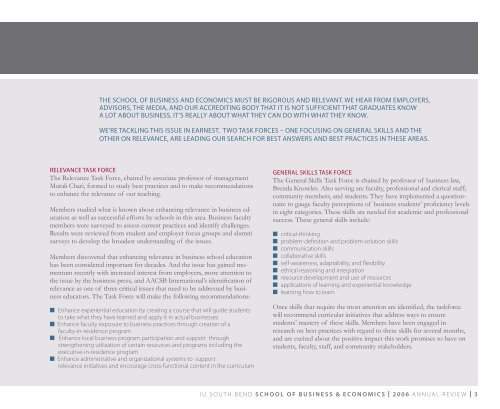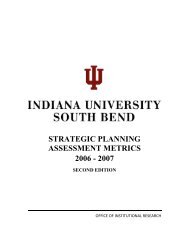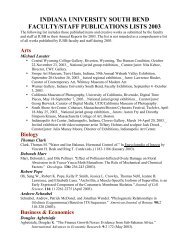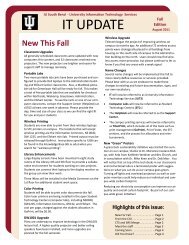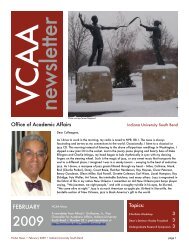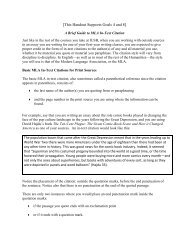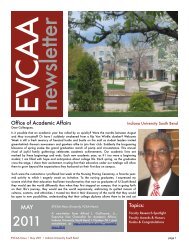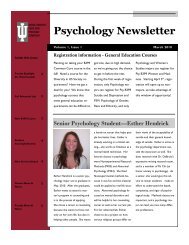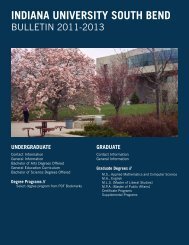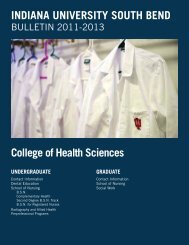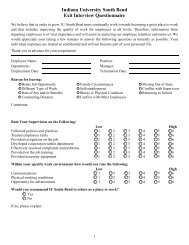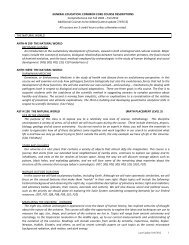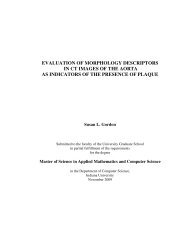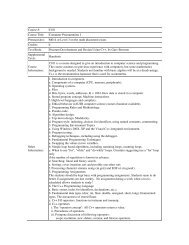School of Business and Economics | Indiana University South Bend
School of Business and Economics | Indiana University South Bend
School of Business and Economics | Indiana University South Bend
Create successful ePaper yourself
Turn your PDF publications into a flip-book with our unique Google optimized e-Paper software.
The <strong>School</strong> <strong>of</strong> <strong>Business</strong> <strong>and</strong> <strong>Economics</strong> must be rigorous <strong>and</strong> relevant. We hear from employers,<br />
advisors, the media, <strong>and</strong> our accrediting body that it is not sufficient that graduates know<br />
a lot about business, it’s really about what they can do with what they know.<br />
We’re tackling this issue in earnest. Two task forces – one focusing on general skills <strong>and</strong> the<br />
other on relevance, are leading our search for best answers <strong>and</strong> best practices in these areas.<br />
Relevance Task Force<br />
The Relevance Task Force, chaired by associate pr<strong>of</strong>essor <strong>of</strong> management<br />
Murali Chari, formed to study best practices <strong>and</strong> to make recommendations<br />
to enhance the relevance <strong>of</strong> our teaching.<br />
Members studied what is known about enhancing relevance in business education<br />
as well as successful efforts by schools in this area. <strong>Business</strong> faculty<br />
members were surveyed to assess current practices <strong>and</strong> identify challenges.<br />
Results were reviewed from student <strong>and</strong> employer focus groups <strong>and</strong> alumni<br />
surveys to develop the broadest underst<strong>and</strong>ing <strong>of</strong> the issues.<br />
Members discovered that enhancing relevance in business school education<br />
has been considered important for decades. And the issue has gained momentum<br />
recently with increased interest from employers, more attention to<br />
the issue by the business press, <strong>and</strong> AACSB International’s identification <strong>of</strong><br />
relevance as one <strong>of</strong> three critical issues that need to be addressed by business<br />
educators. The Task Force will make the following recommendations:<br />
n Enhance experiential education by creating a course that will guide students<br />
to take what they have learned <strong>and</strong> apply it in actual businesses<br />
n Enhance faculty exposure to business practices through creation <strong>of</strong> a<br />
faculty-in-residence program<br />
n Enhance local business program participation <strong>and</strong> support through<br />
strengthening utilization <strong>of</strong> certain resources <strong>and</strong> programs including the<br />
executive-in-residence program<br />
n Enhance administrative <strong>and</strong> organizational systems to support<br />
relevance initiatives <strong>and</strong> encourage cross-functional content in the curriculum<br />
General Skills Task Force<br />
The General Skills Task Force is chaired by pr<strong>of</strong>essor <strong>of</strong> business law,<br />
Brenda Knowles. Also serving are faculty, pr<strong>of</strong>essional <strong>and</strong> clerical staff;<br />
community members, <strong>and</strong> students. They have implemented a questionnaire<br />
to gauge faculty perceptions <strong>of</strong> business students’ pr<strong>of</strong>iciency levels<br />
in eight categories. These skills are needed for academic <strong>and</strong> pr<strong>of</strong>essional<br />
success. These general skills include:<br />
n critical-thinking<br />
n problem-definition <strong>and</strong> problem-solution skills<br />
n communication skills<br />
n collaborative skills<br />
n self-awareness, adaptability, <strong>and</strong> flexibility<br />
n ethical reasoning <strong>and</strong> integration<br />
n resource development <strong>and</strong> use <strong>of</strong> resources<br />
n applications <strong>of</strong> learning <strong>and</strong> experiential knowledge<br />
n learning how to learn<br />
Once skills that require the most attention are identified, the taskforce<br />
will recommend curricular initiatives that address ways to ensure<br />
students’ mastery <strong>of</strong> these skills. Members have been engaged in<br />
research on best practices with regard to these skills for several months,<br />
<strong>and</strong> are excited about the positive impact this work promises to have on<br />
students, faculty, staff, <strong>and</strong> community stakeholders.<br />
i u s o u t h b e n d s c h o o l o f b u s i n e s s & e c o n o m i c s | 2 0 0 6 a n n u a l r e v i e w | 3


